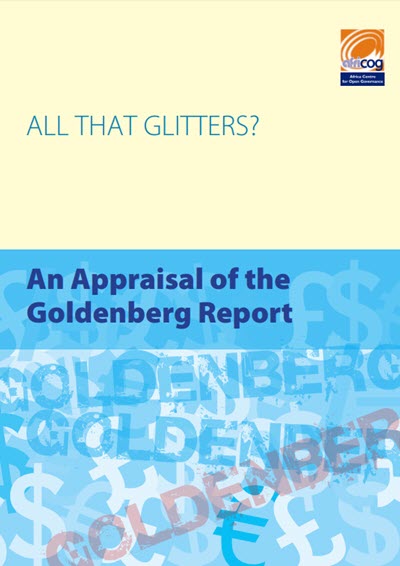“All that Glitters? An Appraisal of the Goldenberg Report” is part of AfriCOG’s contribution to the struggle against impunity and for accountability in Kenya.
In the current climate, as sections of government gear up a campaign to escape accountability for post-election violence, it is instructive that no one has ever been penalised for the mind-boggling series of massive fraud and theft of public funds described in the report of the Commission of Inquiry into the Goldenberg Scandal.
This report forms part of AfriCOG’s
series reviewing the implementation status of the recommendations of
various commissions of inquiry in Kenya. The series began with a general
overview in “Postponing the Truth: How Commissions of Inquiry are used
to circumvent justice in Kenya” and continued with a review of the
recommendations of the Commission of Inquiry into the Illegal/Irregular
Allocation of Public Land (the Ndung’u Commission), in our publication entitled
“Mission Impossible?”
It is hoped that this report will contribute to ensuring continued informed debate on grand corruption in Kenya in general and on the so-called Goldenberg Affair, for which no-one has ever been held accountable. Through this report AfriCOG also hopes to help keep alive public vigilance and the demand for those behind this and other economic crimes to be brought to book.
One of the most noteworthy moments of the Goldenberg Commission’s proceedings was the testimony given by a brave Kenyan whistleblower, David Sadera Munyakei. Ironically, unlike the powerful officials who hid behind pleas of defencelessness against the overweening power of the corrupt Moi dictatorship, he was a humble clerk at the Central Bank at the time. He noticed irregularities in the processing of export compensation monies to a little-known company; Goldenberg International. After receiving warnings to keep quiet about the matter, he smuggled the incriminating documents to opposition MPs who tabled them in Parliament. David lost his job and was jailed for some time.
It was not until 2003 that the Kibaki government, in the first flush of its short-lived “zero tolerance of corruption” policy, made an ultimately unsuccessful attempt to address the scandal by establishing a commission of inquiry.
Unlike many of the criminals who perpetrated one of Kenya’s biggest crimes and continue to profit from their stolen wealth and enjoy public prominence to this day, David died in poverty on July 16, 2006 of tuberculosis.
This report is dedicated to keeping alive the memory of David Munyakei.
